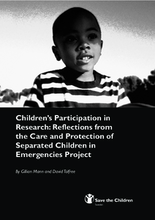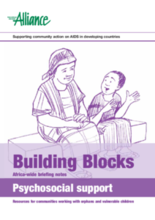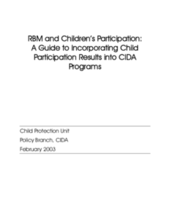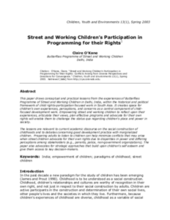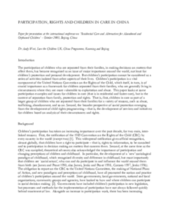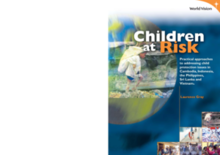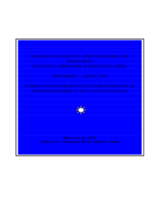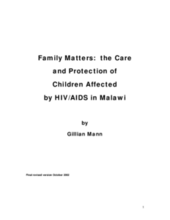Displaying 351 - 360 of 377
A sample survey designed to be used in interviewing parents and guardians of children ages six to twelve years old. The questions assess household financial security, socio-demographic and community characteristics, psychosocial intervention exposure, income generation intervention exposure, health status, HIV/AIDS prevention exposure, legal rights, and coping skills. Includes sample consent form.
Paper described ways in which children separated in emergencies have been involved in research about their community and lives. It focuses on identifying the most appropriate and achievable way to involve children given the reality of their context and circumstances, and includes an appendix of specific games to encourage child participation.
Outlines the psychosocial impacts of HIV/AIDS on children and suggests principles and activities to strengthen psychosocial support. Includes a brief list of follow-up resources.
Outlines the Butterfly Program in India, which utilizes to an empowerment approach to working with children living and working on the streets of New Delhi. Highlights the importance of child participation and rights.
A guide designed to help incorporate child participation results into relevant projects. Includes current practices and lessons learned, sample project plans, and a list of suggested resources.
Focuses on the work of the Butterflies Programme for Street and Working Children in India. Advocates for participatory approaches in child-focused development work.
This paper defines concepts and highlights key topics around orphaned and vulnerable children. It stresses the importance of creating a child-friendly environment and utilizing a holistic approach to care, both which identify children as central participants in decision-making about care and placement.
Discusses approaches to protecting at-risk children in five Asian countries. Identifies programming and policy measures that effectively address child abuse. Emphasis on committing all levels of society to coordinated practical response.
Programmatic methodology and key steps for reintegrating institutionalized children back into the community in a post-conflict environment. Contains comprehensive assessment toolkit in document annex.
This paper describes a qualitative research study conducted in three villages in Malawi. It explores community mobilization and kinship care, as well as striking discrepancies between the perceptions of adults and children regarding care and support. The paper advocates for increased child decision-making, childcare protection policy, and support networks for orphaned children.

